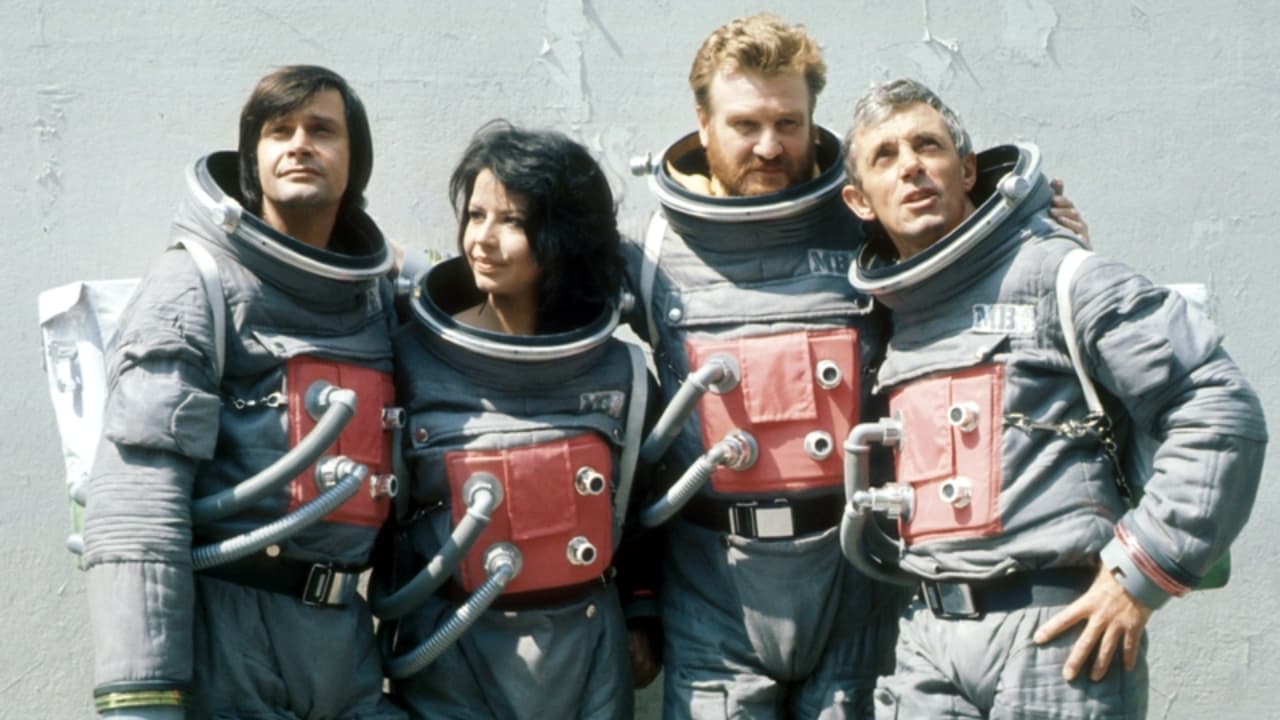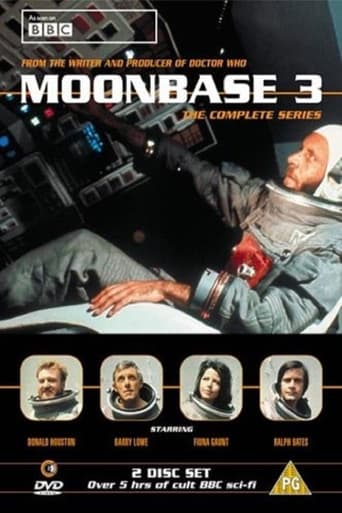Titreenp
SERIOUSLY. This is what the crap Hollywood still puts out?
Pluskylang
Great Film overall
Humaira Grant
It’s not bad or unwatchable but despite the amplitude of the spectacle, the end result is underwhelming.
Haven Kaycee
It is encouraging that the film ends so strongly.Otherwise, it wouldn't have been a particularly memorable film
geordiesdad
When I write this review I try to take into account that the original Star Trek was produced 7 years earlier than this. In light of that fact and the studio awareness of what the then 'modern' viewer expected in their 'future' it falls VERY short in production values.
The acting is, as well, quite dreadful and the writing is no better.
The scenarios are childish and fit for audiences in the 50's.
All in all, it is what Britain was capable of producing at that time...given a few more years they went on to make some absolutely splendid shows but sadly, this is a poor throwback to the paper rockets of years ago.
Don't waste your time unless you want to see how they were UNABLE to reach the heights Star Trek met.
Matthew Kresal
There are some television shows which be labeled "brilliant but canceled" . Moonbase 3, a BBC science fiction series made in 1973 which ran for a mere six episodes, could very much be described as one of those. While there are aspects of Moonbase 3 that are no doubt dated, such as the production design and costumes, it was a show that nonetheless not only foresaw with some accuracy events in the future but remains a fine example of science fiction drama as well.The show's six episodes are anchored by a good cast. Donald Houston gives solid performances as David Caulder, who takes over as Moonbase 3's director and becomes a very believable leader across the episodes. There's also Fiona Grant as the base's psychiatrist Helen Smith who serves as the base's voice of sanity so to speak. There's Ralph Bates as the base's deputy commander Lebrun who is torn between his loyalty to the base and his own ambitions. Last but not least is Barry Lowe as astronaut Tom Hill who oversees much of the base's maintenance and operations as well. Together they form a good group of leading players for the series.The series also has a good set of supporting actors as well. This is especially true of the final episode which features Michael Gough (perhaps best known as Alfred from the Tim Burton Batman movies) as an aging Nobel Prize winner who comes to the Moobase 3 and gives a fine performance in the process. There's the reoccurring role of Director General of the European Space Program played by Peter Bathurst, who has a nice commanding presence in his appearances in a handful of the episodes. There's also the reoccurring staff of the base such as Christine Bradwell as Ingrid, Madhav Sharma as Rao and Garrick Hagon as Bruno Ponti for example. Doctor Who fans will recognize Michael Wisher (perhaps best known for creating the role of Dalek creator Davros) in the first episode and Peter Miles (Davros' henchman Nyder) in the first two episodes as well. Together they make for a fine group of supporting actors during the six episodes.There are some incredibly dated aspects of Moonbase 3 though. Without a doubt what dates it most is its production design and costumes. These two things are indicative the most of the era the show was made in. For example there's aspects of the production design such as the large computes and tape recorders that, thirty-five plus years on, look out of place. The costumes with their loud colors and 1970's fashions are also far too indicative of the era the show was made as well to the point of being a distraction. There's also the special effects which range from good to the point of distraction. That said there are positive aspects to all of these aspects of course such as the space suits and the spacecraft used throughout the series which,while looking like those used on the Apollo Moon missions, still stand up rather well today as well. That said though these aspects serve mostly as a distraction which take away considerably from the other positive aspects of the series.One of the outstanding aspects of the series is that, despite the above mentioned faults, it was meant (and remains) surprisingly realistic. Though it helped to hasten the end of the series, the decision by creators Barry Letts and Terrance Dicks (the creative team on Doctor Who at the time) to keep the series as close to reality as they could imagine a 21st century lunar base being. To this point they brought on James Burke, one of the BBC team that covered the Apollo moon missions, to help insure that the series would remain that way. The result is that the show predicted quite a few things such as the possibility of ice on the lunar surface or, as in the episode Castor And Pollux,international cooperation between the superpowers of the time two years before it first happened in reality with the Apollo-Soyuz mission in 1975. Like 2001: A Space Odyssey before it, the series failed to predict both the lack of further major human exploration of the Moon or the fall of the Soviet Union for example. Yet, judging strictly from when the series was made, these predictions can not be faulted. At any rate the series did make quite a few accurate predictions and the realistic makes this more of a drama then other science fiction series's of the era such as Doctor Who for example.Perhaps the most impressive aspect of the series then are the scripts. The scripts reflect the realistic tone with stories of people under stress (such as Departure And Arrival) and deadlines (Achilles Heal) or the effects of hysteria as seen in Behemoth. Perhaps the best episode, View Of A Dead Planet, deals with hysteria as well. In it a plan to detonate a nuclear bomb to free up arctic areas for development apparently leads to the destruction of the world. The episode therefore is a human drama of how a group of people react to the possibility of being the last of their kind. This episode is an example of the promise showed by the series and its ironic it would be the last episode as well. Being dramas these scripts are not for those expecting aliens and ray guns. The series strength lies in the fact that it is about people instead.While dated to the point of distraction at times, Moonbase 3 is a fine example of science fiction drama. From its actors to its premise and scripts, it is a series dared to be a science fiction drama different from other shows at the time. Sadly the promise shown never got fully executed beyond six episodes, Moonbase 3 remains a show that was brilliant but canceled.
delltarrant
Very nearly lost forever as a result of the BBC's mass clear out of tapes in the 1970's, this gritty and claustrophobic sci fi series was only recently rediscovered in the vaults of a Canadian TV station.This is a long forgotten example of how much more interesting sci fi used to be be pre George Lucas. The BBC never had the budget for whiz bang special effects and so concentrated on characters, story lines and heavyweight theatrical actors. Check out Blakes'7 or Star Cops for other more popular examples of this.Moonbase 3 also contains that other classic BBC sci fi trait, realism, both in characters and settings.The characters here are not Star Trek goody two shoes types who all get along and can be guaranteed to do whatever is morally right, their team includes a manic depressive, an egotist and many other fascinatingly real characters. Some are manipulative and many are suspicious and distrustful of each others motives. The base itself is understaffed and under pressure to deliver value for money,as the base commander says "I can't produce the results without the funding but they won't give me the funding because I can't produce the results!"This sort of bureaucratic nonsense is in stark contrast with the very real dangers and practical hardships faced with living on the moon.In an enclosed society (of sometimes unstable personalities) living under the constant threats of a hostile environment, moonbase 3 is a powerfully written and tension filled sci fi series. Perhaps the most depressingly accurate glimpse into the future of space exploration
CharlesD-2
I watched this series on the sci-fi channel and it was quite a pleasant surprise. I'd never heard of this 70s sci-fi series before but it was british and done by some of the same people who also worked on Doctor Who. This series was most definitely influenced by Doctor Who and other films and tv series but it was unique in it's own vision of the future and man's future of the colonization of space. The series ended on a wonderful episode and should have been brought back for at least another. This is definitely a massively underestimated classic.

